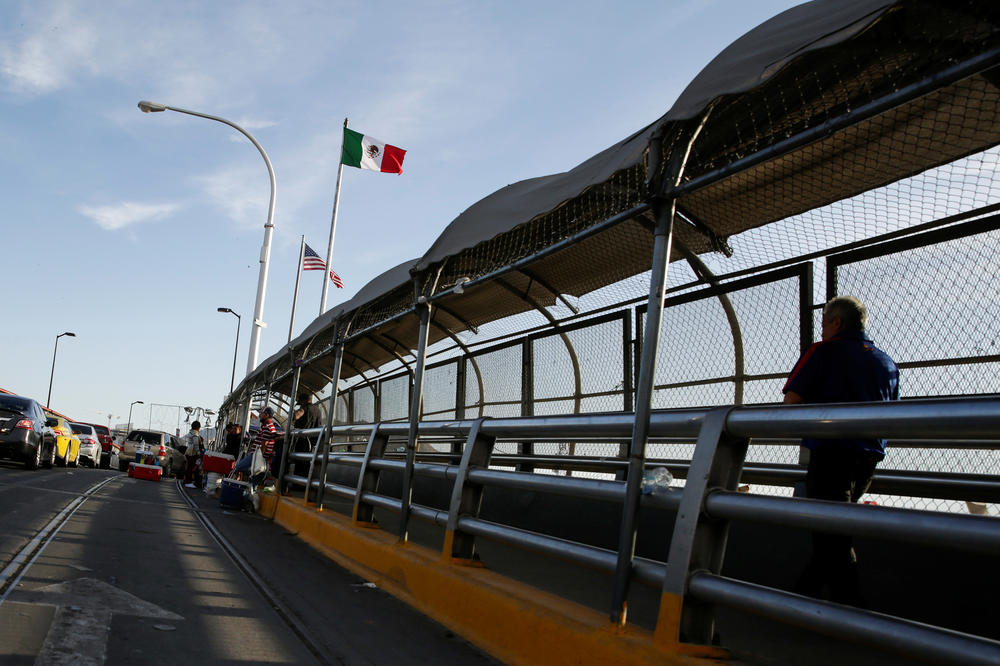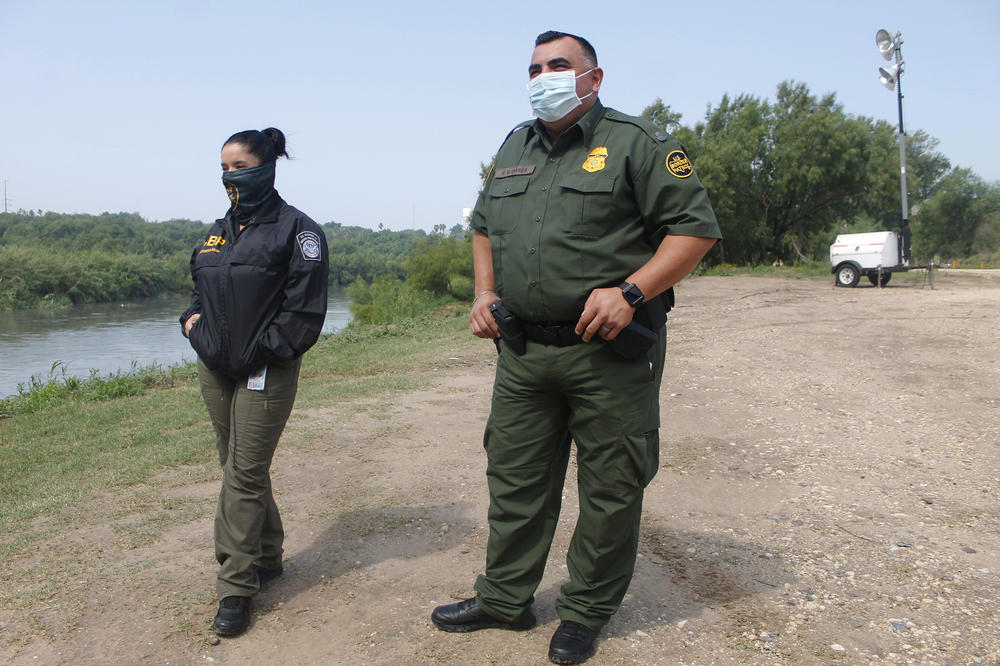Section Branding
Header Content
Ending 'Asylum As We Know It': Using Pandemic To Expel Migrants, Children At Border
Primary Content
When a Salvadoran woman grabbed her 4-year-old daughter and fled their home country in February, the coronavirus wasn't yet a global pandemic.
By the time they reached the U.S.-Mexico border a month later, that had changed. She crossed the Rio Grande, planning to ask for asylum. But Border Patrol agents took her and her daughter right back to Mexico, despite her pleas.
"They told me they didn't care," the woman said in Spanish, asking us not to use her name, out of fear for her safety. "They didn't care what happened to my life. That I had to go — whether to Mexico, to El Salvador, to wherever I wanted, but I wasn't getting into the U.S."
Since March, immigration officials have turned away tens of thousands of migrants like this woman and her daughter. They carried out more than 105,000 rapid expulsions through the end of July, under a public health order that has closed the border to migrants during the coronavirus pandemic, according to data released Thursday. Those expulsions included families and unaccompanied children.
Immigrant advocates say it's the culmination of a three-year push to end asylum protections for most migrants from Central America. They say most migrants are turned away with no access to due process, often without any explanation.
"The administration believes they found the silver bullet with the public health laws where they can just simply bypass the entire asylum system," said Lee Gelernt, the deputy director of the American Civil Liberties Union's Immigrants' Rights Project, which has clashed frequently with the Trump administration in court.
While the country's attention has been focused on the coronavirus, the Trump administration has also proposed sweeping new regulations that would permanently limit asylum protections for migrants arriving at the southern border.
Closed the border to asylum-seekers
The proposed rules would restrict who falls into various categories — asylum protects people who face persecution for their race, religion, nationality, political opinion or membership in a social group — and make it easier for immigration judges to reject asylum requests out of hand.
The White House has complained for years that these migrants are trying to escape from poverty-stricken countries in Central America and are using fake or exaggerated claims to game an overly generous U.S. asylum system.
President Trump has repeatedly called asylum a "scam." At an event with Border Patrol agents in El Centro, Calif., last year, he said: "Our system is full. We're not taking them anymore, OK? Can't do it."
U.S. asylum law traces its roots to World War II. But administration officials argue that asylum-seekers arriving at the southern border are fundamentally different from the refugees fleeing persecution during and after the war. And the administration has worked for years to chip away at asylum protections.
Now it has effectively closed the border to asylum-seekers.
Just as the pandemic was taking off in March, the Centers for Disease Control and Prevention issued an order that closed the border to migrants and other travelers without valid travel documents, citing "the danger to the public health" posed by holding such travelers in crowded detention facilities near the border.
Asylum-seekers not getting "credible fear" interviews
The same day, the Department of Homeland Security closed the border to all "non-essential" travelers — including migrants coming to seek asylum.
Immigration lawyers say what's happening to those migrants at the border is unprecedented.
"They have been basically pushed away from the United States with no process whatsoever," said Tania Guerrero, an immigration lawyer with the Catholic Legal Immigration Network who is based in Ciudad Juárez, Mexico.
"The first question to always answer is, what happened to me?" Guerrero said. "They have no idea what happened. Everyone explains it to be extremely fast and that they're not able to express their fears."
That's a big deal because it means they don't have an opportunity to seek asylum. In the past, migrants were able to make their case to asylum officers. If they were found to have a "credible fear" of persecution in their home country, they would have been allowed to make their case in U.S. immigration court.
Now immigrant advocates say many asylum-seekers are not getting these credible fear interviews, the first step in the process.
A spokesman with Customs and Border Protection told NPR that's handled on a case-by-case basis but declined to explain how it determines who gets to the interview stage while the border is closed because of the pandemic.
The Salvadoran woman who arrived at the border in late March said she never got a chance to ask for asylum or an interview.
She said she left El Salvador with her daughter to escape an abusive ex-partner, the girl's father, who had threatened to kill her. That was in late February.
When the woman and her daughter reached Texas, she said Border Patrol agents quickly returned them to the international bridge between El Paso, Texas, and Ciudad Juárez. She said officials didn't explain anything to her; they just told her to leave.
"So I started to cry and left the bridge," she said. "Some Mexican officials asked what was going on. ... I told them I didn't have anywhere to go. I didn't know what to do."
The woman and her daughter wound up at a shelter run by the Mexican government where other asylum-seekers have been waiting for their U.S. court dates under another administration program known as the Migrant Protection Protocols, or Remain in Mexico.
Another asylum-seeker, from Guatemala, wound up at the same shelter in Ciudad Juárez, along with her two young daughters. She also asked us not to use her name out of concern for her safety.
Physicians and public health experts skeptical
The shelter has been on lockdown since March — but eventually, the coronavirus still got in. A dozen migrants tested positive in an outbreak.
The Guatemalan woman and her daughters had crossed the border between El Paso and Ciudad Juárez in early April when they encountered immigration officials. It was around 3 a.m. when officials dropped her on the international bridge.
"They grabbed us and told us that they were gonna take us back to Mexico," she recalled in Spanish. "They said that they weren't letting anyone into the U.S. and we didn't have any other option."
The shutdown of nonessential travel at the southern border has broad bipartisan support from Americans who desperately want to stop the spread of COVID-19, according to an NPR/Ipsos poll released this week.
But physicians and public health experts are skeptical. They point out that commerce continues, with truckers, students and others still crossing the border every day — and that those people are just as likely to spread the coronavirus as migrants.
Dozens of public health experts at hospitals and medical schools sent an open letter to the CDC this year, saying in part that "the nation's public health laws should not be used as a pretext for overriding humanitarian laws and treaties that provide life-saving protections to refugees seeking asylum and unaccompanied children."
Still, the administration is standing behind the policy. The CDC has extended its public health order. And the Border Patrol says the policy is working in this pandemic.
"It is a good tool that the U.S. government is using to mitigate the spread," said Border Patrol agent Rafael Garza in an interview with Texas Public Radio.
He downplayed the concerns of public health experts. "Whether it's six experts or six Border Patrol agents, I mean, who you gonna trust?" Garza asked.
Since that interview, confirmed cases of the coronavirus have skyrocketed in Texas — especially in the Rio Grande Valley.
Now the Trump administration is trying to make permanent changes to the asylum system.
Last month, the Justice Department and the Department of Homeland Security proposed a rule that would disqualify migrants from asylum if officials determined they could spread an infectious disease. In a letter dated Thursday, public health experts said the rule would scapegoat asylum-seekers by labeling them as national security threats.
"Rules would end asylum as we know it"
In June, the departments announced other sweeping regulations that would make deep changes to the way asylum claims are reviewed. That has prompted widespread concern — even among government officials who are the first to interview asylum-seekers to determine if their claims are credible.
"These rules would end asylum as we know it," said Michael Knowles, president of the American Federation of Government Employees Local 1924 in the Washington, D.C., area and a special representative for the union, which includes hundreds of asylum officers nationwide.
U.S. law requires a careful case-by-case assessment of each asylum claim, Knowles says. If an asylum-seeker is determined to have a well-founded fear of persecution, the person can't be returned to a country where the individual's life or freedom would be in jeopardy.
"These rules would stand all of that on its head," Knowles said. "The impact would be dire, dire consequences for hundreds of thousands of people who are seeking the protection of the U.S."
A Justice Department news release said the 161-page rule would allow authorities to "more effectively separate baseless claims from meritorious ones" and would clarify when an application is "frivolous."
Once the final rules are announced, immigrant advocates say, they plan to sue to block them, as they have challenged many of the Trump administration's previous efforts to limit asylum.
For now, those lawyers are also focused on trying to fight rapid expulsions at the southern border. They're especially concerned about unaccompanied children who are being turned away.
Administration has built a "shadow immigration system"
In normal times, children who cross the border alone would get special consideration under the law. They're supposed to be handed over quickly to the Department of Health and Human Services, which operates a system of shelters where the children stay until they're placed with relatives or a sponsor.
But immigrant advocates say that's not happening. Instead, immigration officials have been putting up the children in hotels near the border until they can put the children on planes back to their home countries.
The administration has built a "shadow immigration system," said the ACLU's Gelernt, "that bypasses all of the protections Congress has painstakingly enacted for asylum-seekers and children over the past 40 years."
The ACLU and immigrant advocates in Texas have tried to challenge this practice in court but have found themselves instead in a cat-and-mouse game with the administration. Every time they file a lawsuit on behalf of an unaccompanied child, the advocates say, the administration hands the child over to HHS, making the legal challenge moot.
"This is completely unlawful, completely unprecedented," Gelernt said. "And that's why we believe the administration is unwilling to have it tested in court."
Copyright 2020 KERA. To see more, visit KERA.



